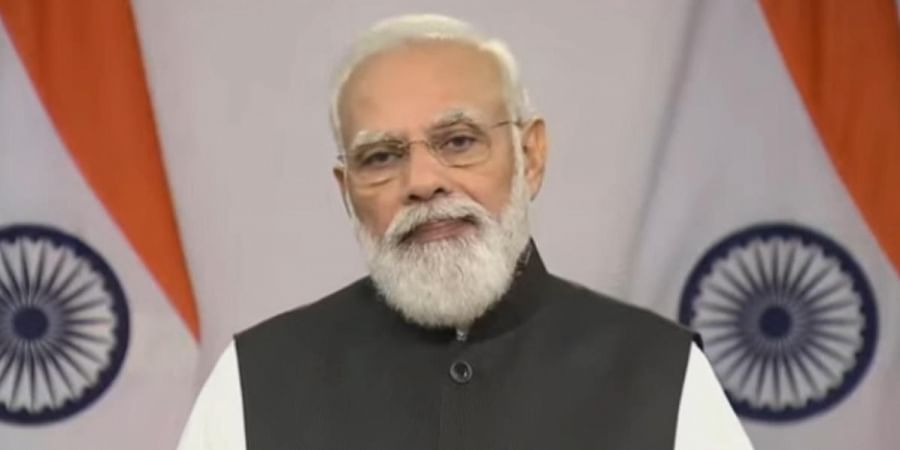Manas Dasgupta
NEW DELHI, Dec 23: As the states start re-imposing local curbs to prevent spread of Coronavirus, the Prime Minister Narendra Modi on Thursday chaired a meeting to review the pandemic situation in the country in the wake of the spread of the highly transmissible Omicron variant.
The country saw a significant rise in the daily Covid-19 tally with 7,495 new cases being reported in the last 24 hours. The cumulative count of Omicron cases also neared 300 across 16 states and Union Territories so far. with a number of infections from the new strain being detected from across states.
Mumbai reported 602 fresh cases of Covid today and one death — detected over the last 24 hours — showing an upward trajectory that has concerned many. It was the highest single day spike in 77 days – on October 6, the city reported 629 cases. The number of active patients is 2,813 and the positivity rate is 1.52 per cent.
Maharashtra and Delhi have reported the maximum number of infections. With 65 cases, Maharashtra has reported the highest incidence of the new strain. It is followed by Delhi with 64 cases, Telangana with 24, Rajasthan (21), Karnataka (19), Kerala (15) and Gujarat (14).
Delhi Chief Minister Arvind Kejriwal on Thursday said the city’s preparations for the highly infectious Covid variant will have a keen focus on home isolation of patients. Arrangements are being made to support and counsel one lakh patients a day in home isolation.
Madhya Pradesh chief minister Shivraj Singh Chouhan announced that night curfew would be brought back across the state from 11 pm to 5 am amid fears of a surge in Covid cases as Omicron cases rise across the country. Madhya Pradesh, however, hasn’t registered any cases of the highly contagious Omicron variant yet.
The union health ministry said of the total Omicron patients, 104 people have recovered or migrated. The Centre has said the Omicron variant is at least thrice more transmissible than the Delta and asked the states and Union Territories to “activate” war rooms, analyse even small trends and surges and take prompt containment action.
Amidst talk of booster dose being planned by several countries for their elderly population, the head of the World Health Organization has warned that blanket booster programmes in rich countries risk prolonging the COVID-19 pandemic and said “no country can boost its way out of the pandemic.” WHO Director-General Tedros Adhanom Ghebreyesus said while vaccines have saved many lives this year, their unequal sharing “has cost many lives.”
Amid the rise in cases of the Omicron variant in India, AIIMS Director Dr Randeep Guleria emphasised on adhering to Covid-appropriate behaviour while observing that people have become lax in following these norms.
Earlier in the day, the Centre held another review meeting with the states wherein the latter, especially those awaiting Assembly election early next year, was asked to expedite vaccination coverage in the wake of Omicron’s spread. The Centre also asked the states to consider local curbs and restrictions ahead of the upcoming festive week. States were also advised to be vigilant and monitor case positivity, doubling rate, and clusters of new cases across districts.
The Union Health Ministry directed the states going in for elections in the near future to “exponentially ramp up vaccination” — especially in the “low coverage districts” to protect the vulnerable population.
On Thursday, Union Health Secretary Rajesh Bhushan at the review meeting raised a red flag that pockets with low vaccination coverage may be more vulnerable to the new Omicron variant — and that district administrations have to pay special attention to ramp up vaccination in these pockets.
But even as nations around the world are lurching into lockdown, steeling themselves for a brutal surge as the Omicron variant spreads like wildfire in various countries, two new British studies provide some early hints that the Omicron variant of the coronavirus may be milder than the delta version.
Scientists stress that even if the findings of these early studies hold up, any reductions in severity need to be weighed against the fact Omicron spreads much faster than delta and is more able to evade vaccines. Sheer numbers of infections could still overwhelm hospitals. Still, the new studies released on Wednesday seem to bolster earlier research that suggests Omicron may not be as harmful as the Delta variant. “Cautious optimism is perhaps the best way to look at this,” the scientists said.
They said hospitalisation risks for Omicron cases in England, finding people infected with the variant are around 20% less likely to go to the hospital at all than those infected with the Delta variant, and 40% less likely to be hospitalised for a night or more. That analysis included all cases of COVID-19 confirmed by PCR tests in England in the first half of December in which the variant could be identified: 56,000 cases of omicron and 269,000 cases of delta.
A separate study in Scotland by scientists at the University of Edinburgh and other experts, suggested the risk of hospitalization was two-thirds less with Omicron than Delta. But that study pointed out that the nearly 24,000 Omicron cases in Scotland were predominantly among younger adults ages 20 to 39. Younger people are much less likely to develop severe cases of COVID-19. “This national investigation is one of the first to show that Omicron is less likely to result in COVID-19 hospitalization than delta,” researchers wrote. While the findings are early observations, “they are encouraging,” the authors wrote.

